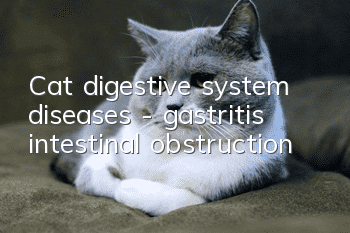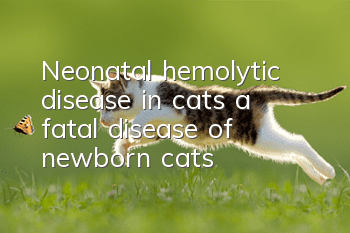Cat digestive system diseases - gastritis, intestinal obstruction

The digestive system extends from the mouth to the anus. Its main function is to break down food into smaller molecules so that body cells can absorb and utilize nutrients and energy.
Symptoms of digestive tract diseases include loss of appetite, vomiting, and diarrhea. Diseases outside the digestive tract organs, such as kidney disease, endocrine abnormalities, infections, tumors, etc., can also cause various symptoms of the digestive organs.
Vomiting and diarrhea are symptoms that occur in many diseases. Therefore, when a cat has digestive symptoms, it is necessary to observe the amount, frequency, color, etc. of vomit and diarrhea before consulting a veterinarian in more detail.
01
Irritant gastritis:
There are two things that are often swallowed by cats, causing stomach irritation and acute vomiting: hair and grass.
Especially during the shedding season, cats will swallow too much hair, and the swallowed hair must be excreted through vomiting or feces. Therefore, cats that lick their fur excessively or have long-haired cats are more likely to vomit hair balls.
In addition, cats that like to lick or bite plastic bags often swallow plastic bags, irritating their stomachs and causing acute vomiting.
Many cats will continue to vomit within 24 hours after vomiting a large number of hair balls. If the cat still has an appetite after vomiting the hair ball and does not vomit after eating, you can observe it at home first. However, if vomiting is frequent and even causes the cat to stop eating, symptomatic treatment may be needed to prevent further vomiting or dehydration of the cat.
Most cats eat grass because they like the taste of grass. Most grass is difficult to digest and will irritate the stomach wall. Eating too much grass will cause the cat to vomit the digested grass and part of the stomach contents. Therefore, it is still necessary to prevent cats from overeating grass.
02 Gastrointestinal foreign body obstruction:
Intestinal obstruction, referred to as intestinal obstruction, is a very common digestive system disease.
It refers to a disease in which the intestinal lumen is blocked due to physical factors or functional factors, preventing the intestinal contents from descending smoothly.
Common causes include ingestion of foreign bodies, constipation caused by various inducements, intestinal parasites, enteritis and complications of some rectal diseases.
In addition, intestinal obstruction may also occur when intussusception, severe intestinal inflammation, or intestinal tumors occur.
1. Common symptoms:
① Foreign bodies swallowed into the stomach will cause intermittent vomiting/anorexia, and entering the small intestine will cause obstruction. The cat will continue to vomit, even if it has not eaten, it will still vomit a large amount of liquid.
②Cats with severe vomiting will then develop symptoms of dehydration and become weakPowerless.
2. How to diagnose:
①Physical examination;
②Auscultation: When the cat has severe intestinal obstruction, there is no borborygmire on abdominal auscultation;
③Imaging examination: Abdominal ultrasound can be used for the entire segment of intussusception;
3. How to treat:
There are generally two options: conventional conservative treatment and surgical treatment
Conventional conservative treatment mainly follows the three-character principle: diarrhea. Cats may be given edible oil orally to help cats expel obstructions in their intestines.
Surgical treatment:
① An intravenous drip must be given before surgery to restore symptoms of dehydration, electrolytes and acid-base abnormalities.
② Foreign bodies stuck in the esophagus can be pinched out using an endoscope.
③The foreign body may need to be removed by exploratory laparotomy.
④Give the cat antiemetics and gastrointestinal mucosal protective agents.
⑤ Let the damaged intestinal mucosa and the intestines at the surgical site rest for 12-24 hours after surgery, and then give liquid or pureed food. To calculate calorie requirements: 60X body weight (Kg). Give 1/3 of the required calories on the first day and increase to the total amount over 3 days.
4. To prevent intestinal obstruction in cats, we can consider the disease triggers:
Healthy feeding and prevention of constipation:
Constipation is one of the common causes of intestinal obstruction. Probiotics and pumpkin can be added to food to effectively relieve constipation. Encourage cats to drink more water and exercise more, and you can adopt a feeding method of small meals and frequent meals.
Brush frequently:
It can effectively reduce the amount of hair swallowed into the intestines and stomach by cats licking their hair, thereby preventing constipation caused by hairballs. (Hair cream and cat grass are also good choices)
Keep foreign objects away to prevent accidental ingestion:
Put away foreign objects at home that cats may come into contact with, such as wool, plastic bags, fruit shells, bones, etc.
Regular deworming to drive away parasites:
One cause of intestinal obstruction in cats is intestinal intussusception or obstruction caused by parasites.
Feline intestinal obstruction is a disease that requires attention. Prevention is the most important. Finding the cause and timely treatment are the keys to rescue!
- Four health killers for newborn kittens and kittens
- The Difference Between Cat Conjunctivitis and Cat Nasal Branch
- How to change the cat’s habit of wandering at night? Correct the cat’s nocturnal disorder!
- What are cat nail polishes? Are cat nail polishes harmful to cats?
- How to prevent cats from being picky eaters?
- What are the main reasons why cats often retching?
- What to do if a cat eats plastic wrapping paper
- The difference between cats sleeping by their heads and by their feet
- What does cat fussing mean? How many days does a cat usually have trouble?
- Have you heard of the story of a cat saving a life? I was very moved after reading it!



